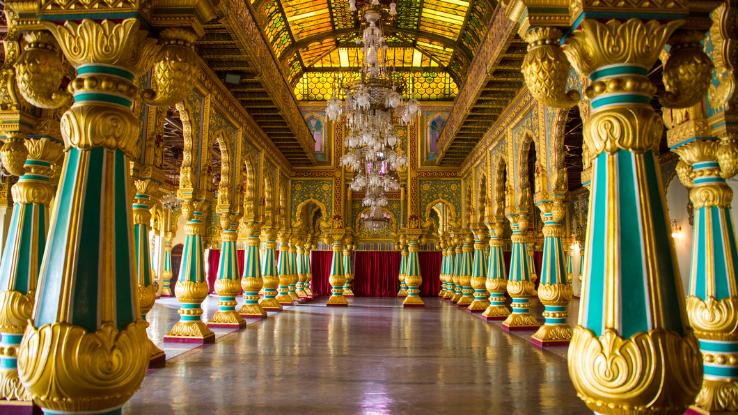
Royal families around the world — way beyond the United Kingdom — own enormous tracts of land with monumental buildings and other elaborate structures. Those holdings range from simple forts and temples to lavish castles and palaces, many of which played pivotal roles in military, political, religious and cultural history.
Beyond that, they are enormous, ostentatious, sometimes unusual and always fabulous. Check out some of the most extravagant homes and properties owned by monarchies around the world.
Hillsborough Castle
Hillsborough Castle is the official home of the Secretary of State for Northern Ireland, and it’s also the British Royal Family’s residence when visiting. The royals refer to it as a “late-18th century Irish big house,” not a castle. If that doesn’t make sense, you have to understand the peculiar British terminology.
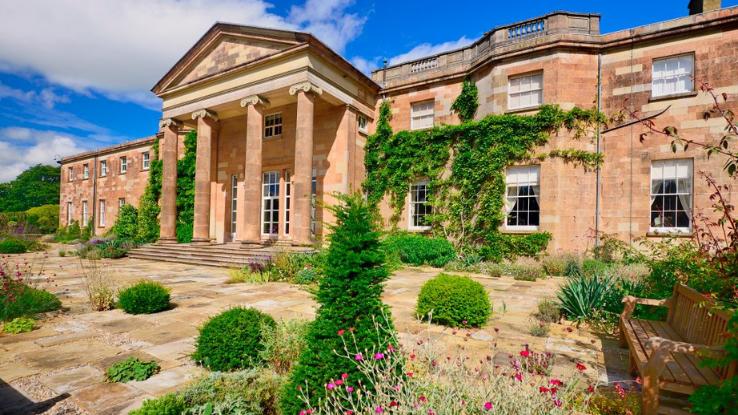
“Big houses” often featured paintings by wandering artists, but Hillsborough Castle has always displayed intentional collections, including works by Irish artists from The Royal Collection. The ceremonial heart of the castle — The Throne Room — displays the most prized paintings, featuring themes from the Bible, mythology and ancient history.
Ivy Cottage
Ivy Cottage is a standalone, three-bedroom house on the grounds of Kensington Palace. For a time, it was the house of the deputy head of the palace’s property department. Before they married in October 2018, Princess Eugenie — Prince Andrew’s daughter — and American Jack Brooksbank moved into the Ivy Cottage.
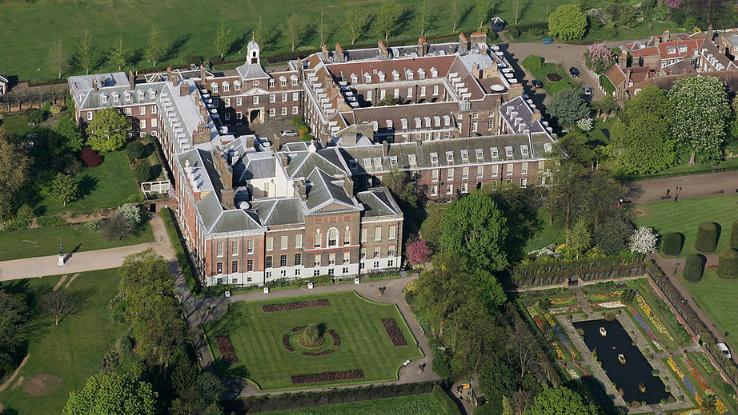
Princess Eugenie had previously lived with her sister, Princess Beatrice, at St. James Palace. A three-bedroom house may not seem particularly grand, but keep in mind that it’s on the grounds of Kensington Palace and is sure to be up to snuff. When judging the grandeur of any property, you always have to consider your neighbors, after all.
Bagshot Park
You can find the village of Bagshot about 11 miles south of Windsor. The royal residence known as Bagshot Park sits on a tract of open land called Bagshot Heath. In 1879, the 120-room building was constructed as a home for Queen Victoria’s son, Prince Arthur. In 1998, the mansion was leased to Prince Edward for 150 years and renovated to suit him.
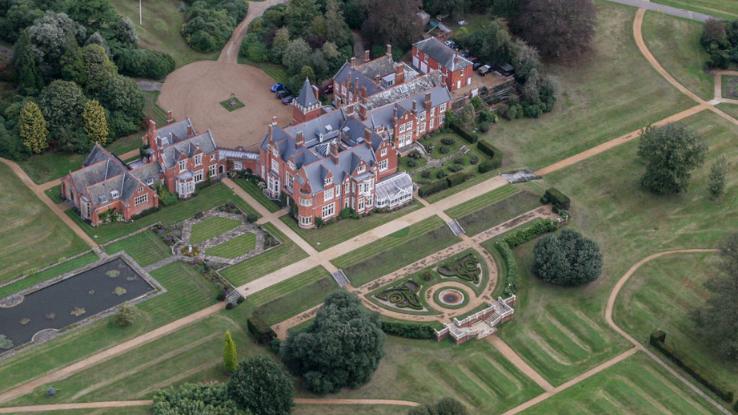
It includes an Indian billiard room wing — a wing! — that was prefabricated in India at the request of the Duke of Connaught and installed in the 1880s. The whole two-year project was a wedding gift from Indian princes.
Windsor Castle
Windsor Castle has been a royal home and fortress for more than 900 years, and it’s Queen Elizabeth’s regular weekend home. She also lives there during “Easter Court” from March to April annually. State banquets are held in St. George’s Hall, which is a mere 55.5 meters long and 9 meters wide. The hall features a table that will seat up to 160 guests.
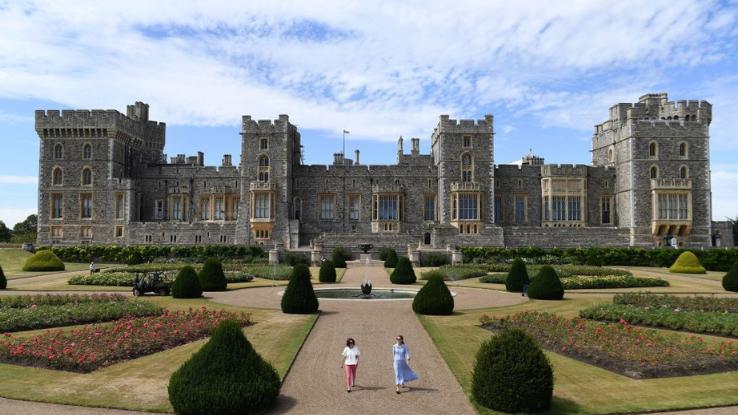
Windsor Castle has hosted weddings, funerals and burials. Those interred in the Chapel include The Queen Mother, King George VI and Princess Margaret. The Royal Archives and Royal Photograph Collection are housed in the castle’s Round Tower.
Sandringham House
Sandringham Estate is a 20,000-acre property in Norfolk. It’s Queen Elizabeth’s country retreat and has been the private home of British Monarchs since 1862. The Jacobean-style red brick and limestone “house” has nine separate chimney clusters. Corridors connecting the main rooms — saloon, drawing room and ballroom — display Oriental and Indian arms and armor collected by Edward VII.
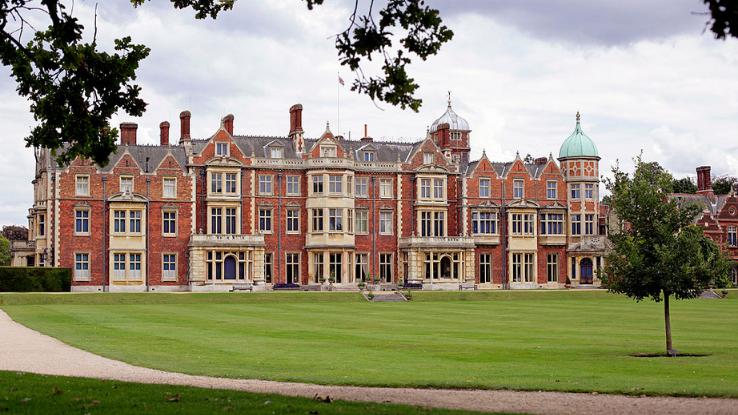
Oddly, the house even has a weighing machine. Edward VI liked to weigh his guests on the way in and then weigh them again on the way out. He allegedly wanted to confirm that his hospitality had fattened them up, although it sounds more like he didn’t trust them not to steal the good silver.
Anmer Hall
If you were visiting Queen Elizabeth at her weekend escape at Sandringham, you would be near the village of Anmer in Norfolk, England. In that village, Anmer Hall was a wedding gift from the Queen to the Duke and Duchess of Cambridge (Will and Kate).
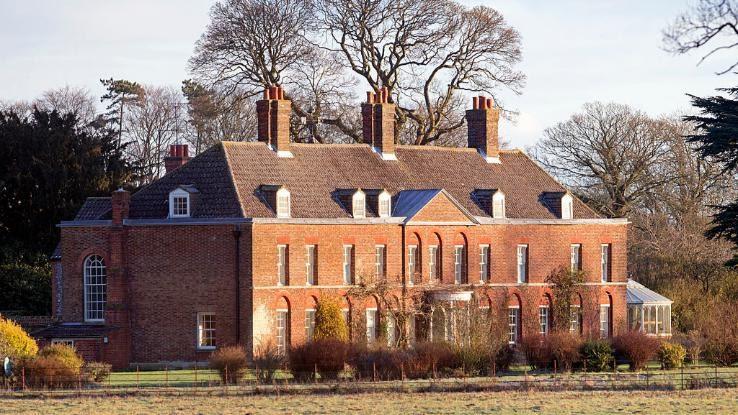
Anmer Hall is a 10-bedroom, two-story home with 13 ground-floor windows. It was renovated in 2013 and 2014 to accommodate Will and Kate. Renovations included a new roof and kitchen, the addition of a conservatory, internal redecoration and the addition of more trees to provide more privacy. It’s primarily a country retreat and home for the holidays.
Llwynywermod
Llwynywermod is a 192-acre estate near Myddfai, Llandovery, Carmarthenshire in Wales. It is owned by the Duchy of Cornwall, making it part of the estate owned by the Prince of Wales. Prince Charles and his wife, Camilla, Duchess of Cornwall, moved into the property in 2008.
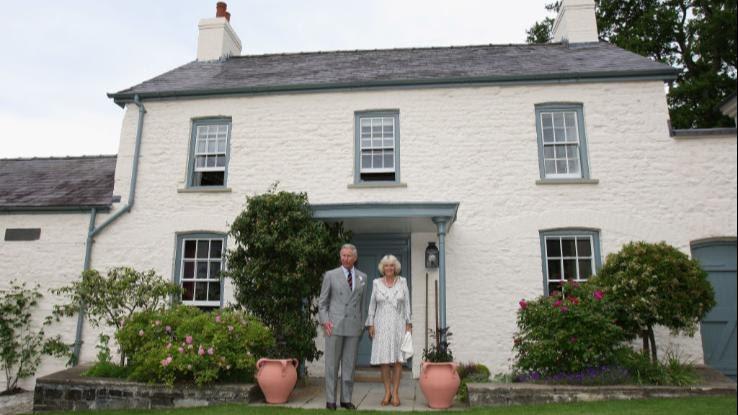
Prince Charles has long been an advocate for certain principles of architecture. The three-bedroom farmhouse — once the coach house for a long-gone, 13-bedroom country house — was renovated using traditional techniques favored by the Prince. Not fabulous, you say? Keep in mind this is just one of Charles’ haunts. He also resides at Highgrove House, Birkhall and Clarence House.
Clarence House
Clarence House sits beside St. James Palace in London and is the official London residence of the Prince of Wales and the Duchess of Cornwall (Charles and Camilla). It was the Queen Mother’s home until 2002, and Princess (now Queen) Elizabeth and the Duke of Edinburgh lived there after they got married in 1947. The house was damaged during the Blitz in World War II.
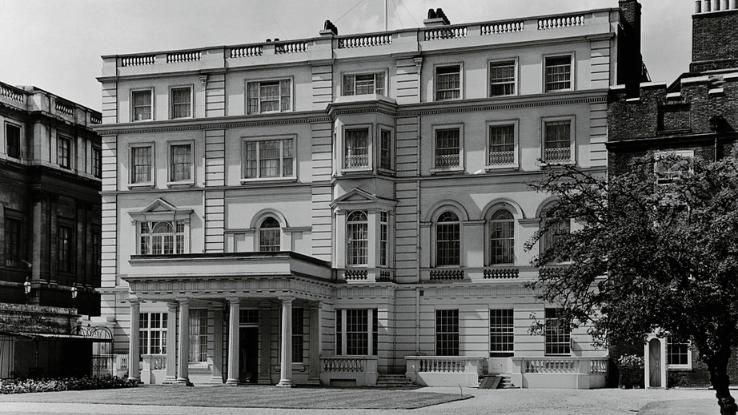
Renovations for Prince Charles included new color schemes, textiles and artworks from The Royal Collection as well as his personal art collection. The house was rewired, most major rooms were redecorated, and the exterior got a facelift.
Frogmore House and Cottage
Frogmore Park is located in Home Park, Windsor, just half a mile from Windsor Castle. Queen Charlotte used the house as a retreat in the late 1700s and early 1800s. The house was modernized between 1795 and 1804 to add a second floor, pavilions and a new dining room and library. Frogmore House hasn’t been lived in since 1872, but it is still used to host events.
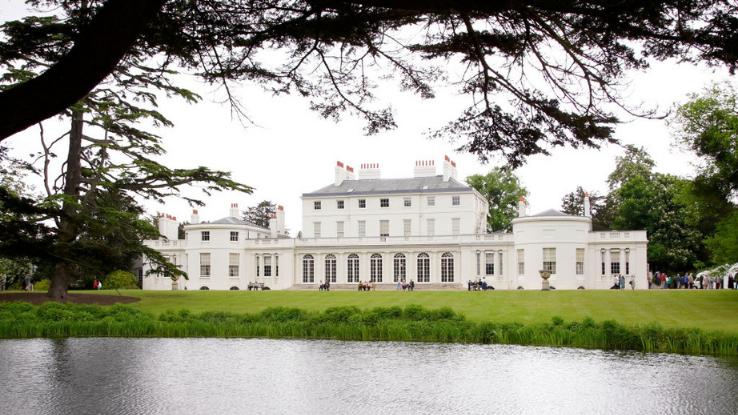
Queen Charlotte also built a smaller house in the gardens in 1801 — Frogmore Cottage. Until very recently, Frogmore Cottage’s occupants were Meghan Markle and her husband, Prince Harry — the Duchess and Duke of Sussex.
Gatcombe Park
If you’re getting married, consider inviting Queen Elizabeth II. She is such a fabulous gift-giver! Gatcombe Park is located between Minchinhampton and Avening in Gloucestershire, England. Constructed between 1771 and 1774, the manor house is made of Bath stone. It has nine bedrooms, four reception rooms, a library, a billiard room and staff accommodations.
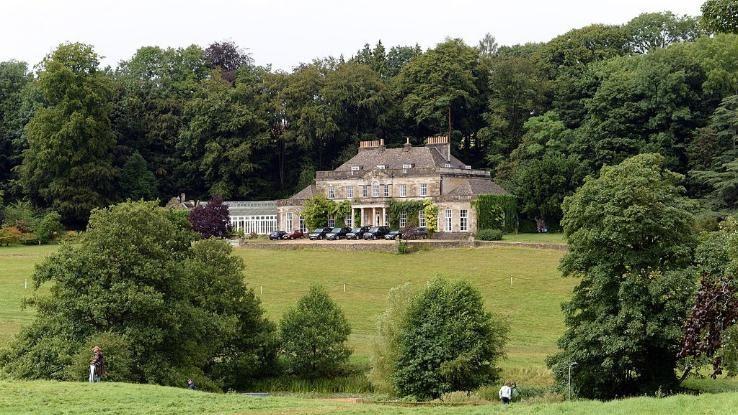
In 1976, Queen Elizabeth purchased Gatcombe Park for Princess Anne and Captain Mark Phillips. They purchased the neighboring farm, bringing the estate to 730 acres, including a trout lake, stables and an airstrip. Gatcombe Park hosts a major equestrian event in August every year.
Highgrove House
Prince Charles’ architectural project house in Wales and his London home are not his only abodes. The family residence of the Prince of Wales and Duchess of Cornwall is Highgrove House in Gloucestershire, England. Charles’ Duchy of Cornwall purchased it in 1980 along with the adjoining Broadfield farm, to bring the total land holdings around Highgrove House to 1,112 acres.
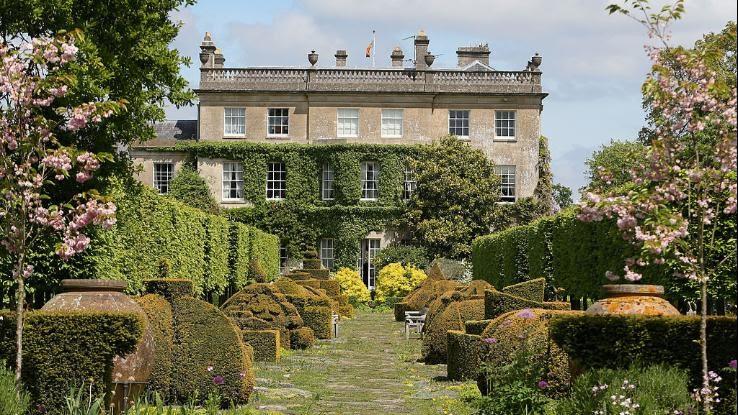
Charles runs the gardens and house according to his well-established environmental principles. The house features solar panels and is heated by a wood chip boiler. The gardens have been featured in the media and receive more than 30,000 visitors annually.
The Palace of Holyroodhouse
Scotland’s Holyroodhouse was originally a monastery founded by David I in 1128. When Edinburgh was selected as the capital of Scotland, the King chose to live in Holyroodhouse rather than in Edinburgh Castle. James IV built the palace in 1501, and renovations in 1601 added a tower to establish a symmetrical facade.
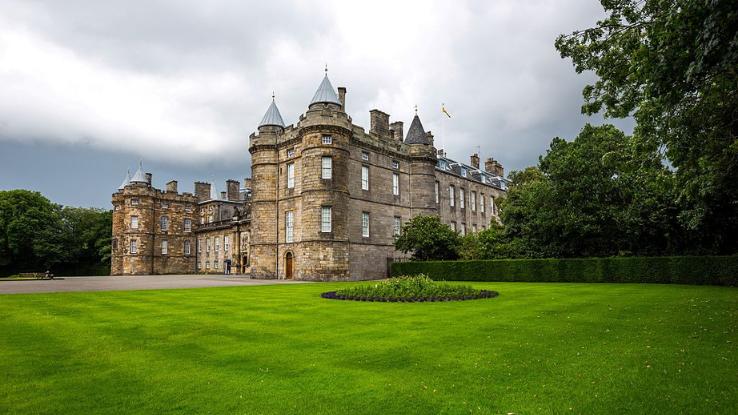
New royal apartments were added, featuring richly decorated rooms and plasterwork ceilings around a quadrangle. The ceilings feature plaster angels holding the Honors of Scotland and fragments of Lattanzio Gambara frescoes. The Great Gallery features 110 portraits of Scottish monarchs painted between 1684 and 1686.
Buckingham Palace
Buckingham Palace has been the official London residence and head office of the British Monarchy since Queen Victoria’s 1837 accession. It consists of three wings built around a central courtyard. Original interior decorating featured bright scagliola and blue and pink lapis accents. King Edward VII redecorated with lots of cream and gold.
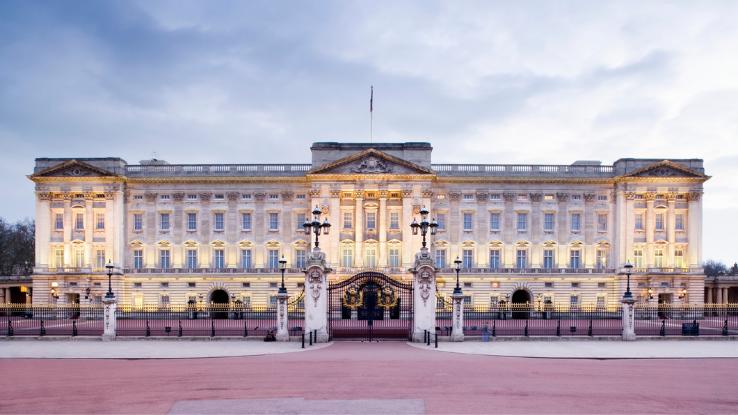
Buckingham Palace is 108 meters long, 120 meters deep and 24 meters high. There are 775 rooms, including 19 staterooms, 52 royal and guest rooms, 188 staff bedrooms, 92 offices and 78 bathrooms. The palace’s garden is reportedly the largest private garden in London.
Kensington Palace
Kensington Palace is located in Kensington Gardens in the Royal Borough of Kensington and Chelsea in London. A number of royals live there, including the Duke and Duchess of Cambridge (Will and Kate) and Princess Eugenie and Jack Brooksbank, as well as several other lesser-known royals, including first cousins of the Queen.
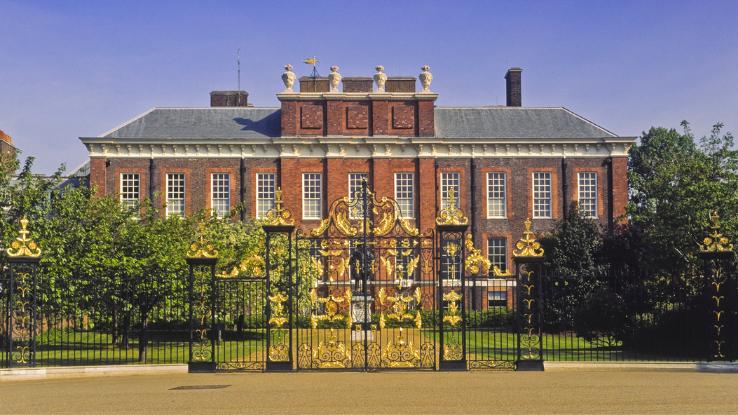
King George I developed the Privy Chamber, Cupola Room and Withdrawing Room staterooms in the palace and spent lavishly to establish new royal apartments. His decorating flourishes featured trompe l’oeil ceilings and walls, gold and blue-domed ceilings, and pilasters, doorways and niches mounted with statues.
Althorp House
The Spencer family has lived at Althorp House for five centuries. The most famous Spencer, of course, is Diana, who married the Prince of Wales. Lady Diana Spencer grew up at Althorp House, now inhabited by the ninth Earl of Spencer, her brother, Charles Spencer.
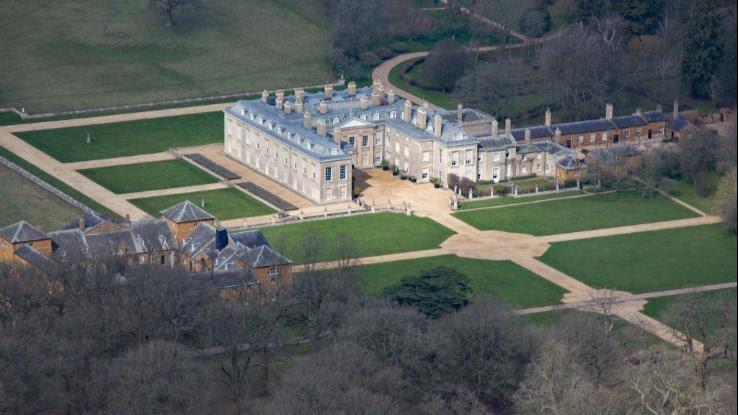
The house includes a massive art collection, including family portraits of 19 generations of Spencers. Althorp House is located in the East Midlands. It has 31 bedrooms and about 100,000 square feet of space. The Princess of Wales is buried on a tree-covered island in a lake on the 14,000-acre property.
Drottningholm Palace
Drottningholm Palace is the permanent residence of the King and Queen of Sweden. Built in the 1600s, it is on UNESCO’s World Heritage list of protected sites. The palace includes a church where the faithful of the Lovon parish worship every Sunday. It also has an opera house.
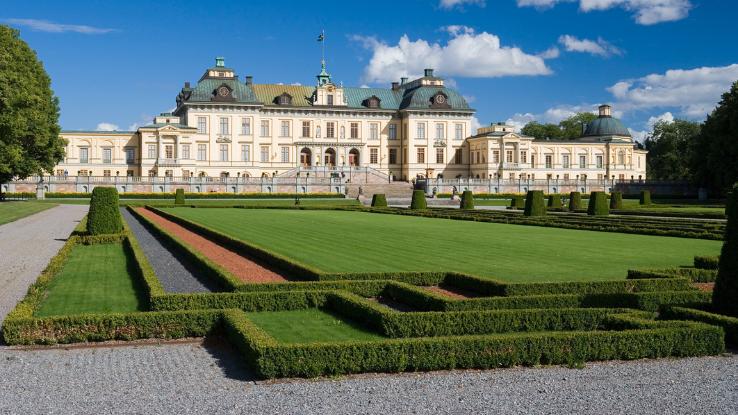
Queen Hedvig Eleonora’s state bedchamber has been described as one of Sweden’s grandest Baroque rooms. The room features paintings by Ehrenstrahl that depict the history of her marriage. The Goddess of Fate is shown measuring out the life thread of the Queen’s son, depicting her fear that her son would die young. (He was 41 when he died.)
Castle of Laeken
The King of the Belgians lives in the Castle of Laeken in Brussels. It sits in the Royal Domain of Laeken, a large park that is off limits to the public. The Belgians clearly believe strongly in royal work-life balance. While Laeken is the official residence of the royal family, it is not the official palace.
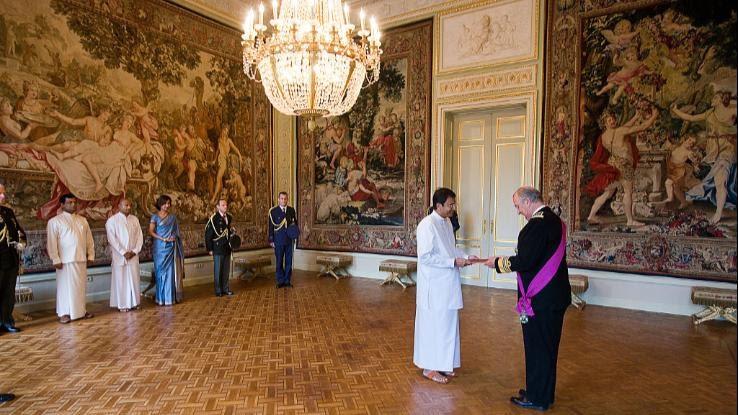
The palace is the Royal Palace of Brussels, where the King conducts the affairs of state. The grounds of the Castle of Laeken include private stone-walled gardens featuring lakes, a golf course, outdoor art, pavilions, and colonies of geese, cormorants and herons.
Prince’s Palace of Monaco
The Sovereign Prince of Monaco lives in a Genoese fortress built in 1191 that is now called the Prince’s Palace of Monaco. The fortress was captured by the Grimaldi family in 1297, and it has remained the official residence of the royal family ever since, except during a 20-year period of exile in the 18th century (a story for another time).
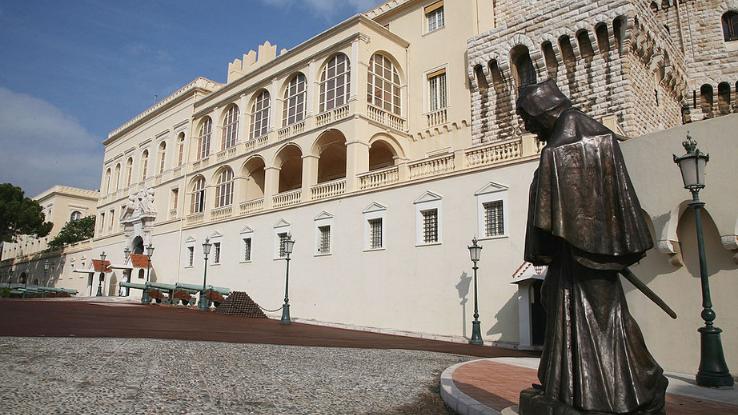
Many of the other royal families on this list have multiple royal homes. In contrast, Monaco’s ruling monarchs have occupied the same single palace for more than 700 years. It serves as the royal residence, headquarters for Prince Albert II, a tourist attraction and a museum.
Amalienborg Palace
The Amalienborg Palace in Copenhagen, Denmark, was originally built for four noble families. It was constructed with four classical palace facades surrounding an octagonal courtyard. The exteriors were identical, but the interiors were different, although all in the rococo style. In 1794, Denmark’s palace and government building, Christiansborg Palace, was destroyed by fire.
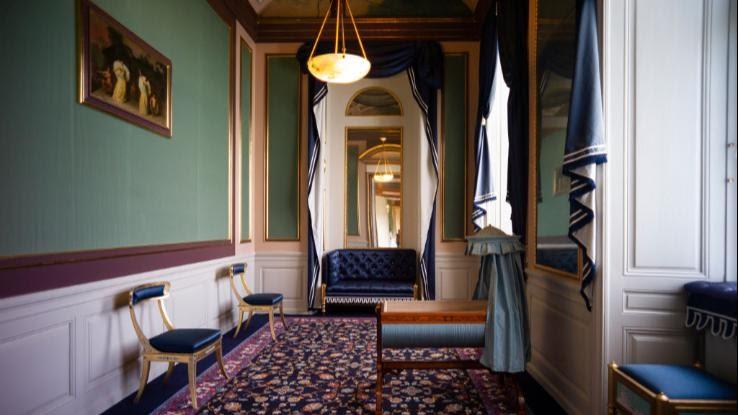
After the fire, the royal family of Denmark bought Amalienborg Palace(s) and renamed the palaces Christian VII’s Palace, Christian VIII’s Palace, Frederick VIII’s Palace and Christian IX’s Palace. Generations of Denmark’s monarchy have lived there since.
Royal Palace of Norway
Norway’s Royal Palace has two wings and three stories. It was downsized from the original design that consisted of an H-shaped building with a temple front supported by pillars, as that design was considered too expensive to maintain.
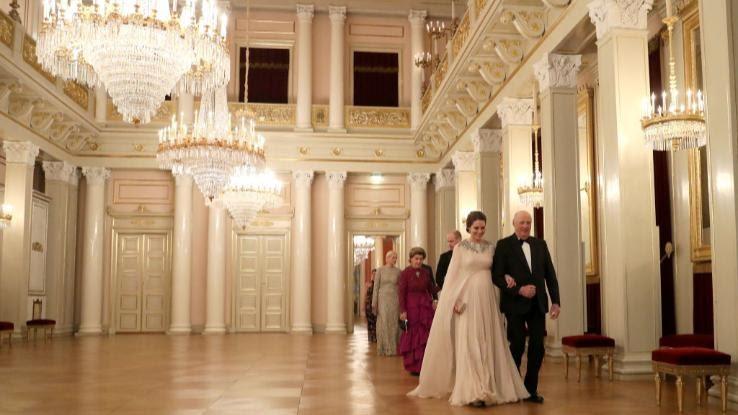
The architect refused to compromise his design for the palace’s Great Hall, however. He described it as “the only truly grand room in the building.” That single room consumed one-third of the total decoration budget for the entire second floor. Its ceilings are nearly 11 meters high, and the room is 360 square meters in area. It’s white and gold, with pink wall panels and a sky-blue ceiling.
Royal Palace, Phnom Penh
Preah Barum Reachea Veang Nei Preah Reacheanachak Kampuchea is the Royal Palace of Cambodia, located in Phnom Penh. Cambodia’s kings have lived there since it was constructed in the 1860s, except for a period under Cambodia’s Khmer Rouge regime. It marked the relocation of Cambodia’s capital from Oudong.
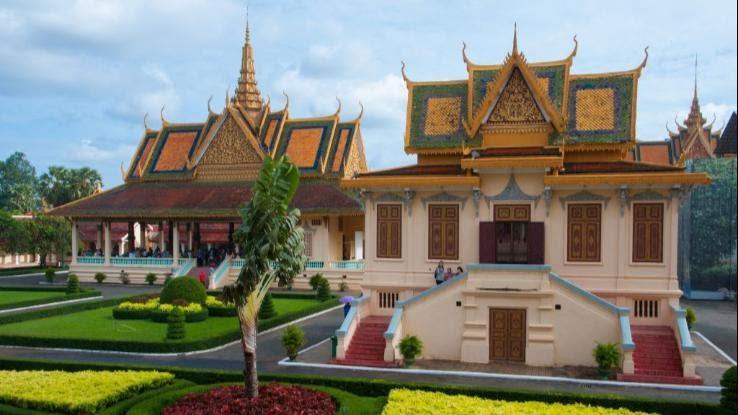
The King, generals and officials rule from the Preah Tineang Tevea Vinnichay Mohai Moha Prasat (Throne Hall), a cross-shaped building with three spires. The tallest spire — 59 meters high — holds a four-faced head of Brahma, the god of creation in Hinduism. The King resides in a self-contained building called the Khemarin Palace.
The Royal Palace, Rabat
The Dar al-Makhzen Palace in Rabat, Morocco, is the home of King Mohammed VI of Morocco. He is the latest king from a line of Alaouite succession that began in the 700s. The current palace was built in 1964 to replace the old palace built by Sultan Muhammad IV.
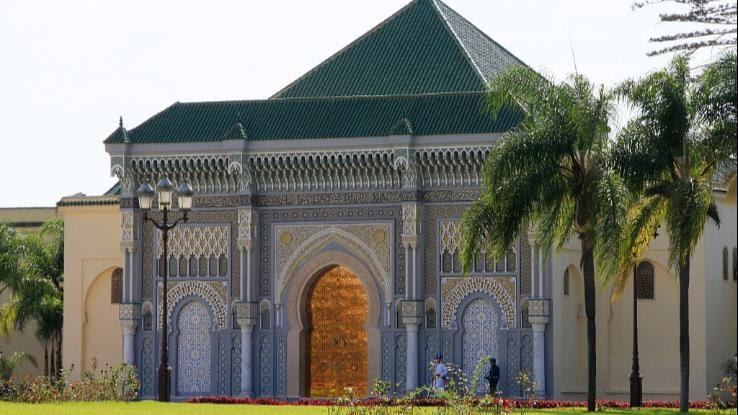
It includes a parade ground for public gatherings, accommodations for the Royal Guard, a cooking school, a library and the College Royal — a school for members of the Moroccan monarchy. It also includes a small mosque. Except for the parade ground for public events, the palace is closed to the public.
Al Alam Palace
Oman’s Sultan has six residences, including Old Muscat’s Al Alam Palace. It was built in 1972 and overlooks the Gulf of Oman. It’s surrounded by the 16th Century Mirani and Jalali Forts and features surfaces of highly polished marble. A guest villa on the grounds has its own pool, spa and gardens.
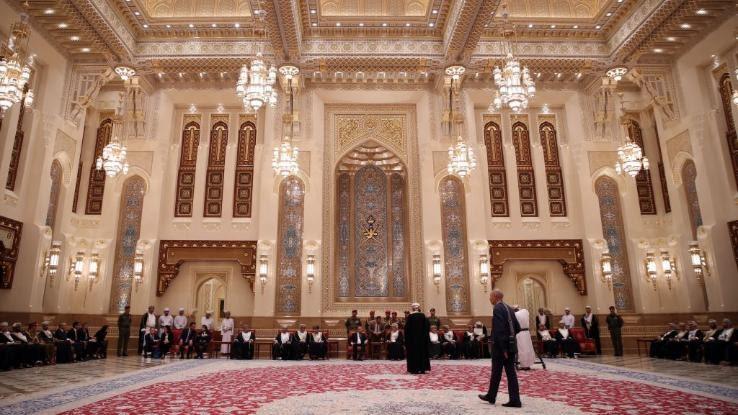
The palace is the “official” residence of the Sultan of Oman, but the Sultan generally resides elsewhere. He does receive foreign dignitaries at Al Alam. How do you know if he’s home? If the Omani flag at the palace’s main entrance is up, the Sultan is on the premises.
Tokyo Imperial Palace
The Emperor of Japan’s primary residence is at Kōkyo, a large park in Tokyo’s Chiyoda district on the site of the old Edo Castle. The palace sits on 1.15 square kilometers of gardens. The complex includes the Kyūden Palace for imperial functions and a separate residence for the Emperor and Empress. The residence is in Fukiage Garden, which includes three Kyūchū-sanden (palace sanctuaries).
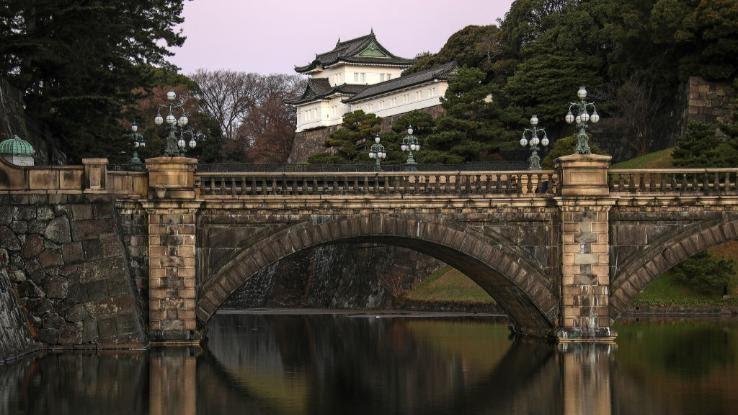
In 2012, The Oxford Handbook of Capitalism reported that the palace’s grounds were more valuable than all of California’s real estate during Japan’s 1980’s real estate boom years. That’s pretty impressive!
Royal Palace of Amsterdam
King Willem-Alexander’s royal palace in Amsterdam was initially built as the city’s town hall. It was converted to a palace by King Louis Bonaparte — Emperor Napoleon’s brother — in 1808. The palace’s marble galleries are filled with sculptures by artists such as Govert Flinck and Ferdinand Bol, who studied with Rembrandt.
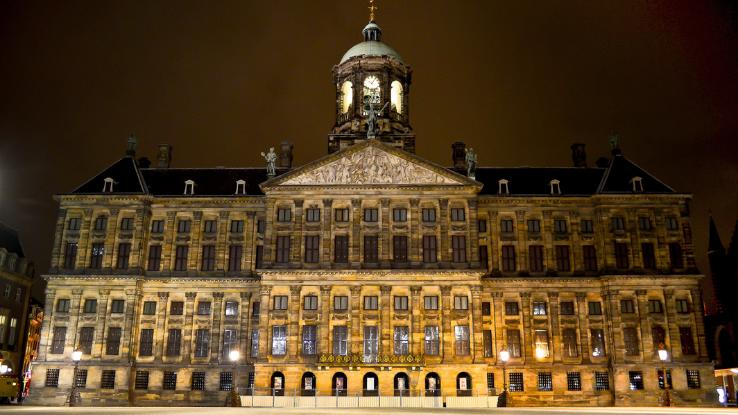
The palace features a 6-meter statue of Atlas carrying the world on his back, which paid tribute to Holland’s planet-wide interests in the 17th Century. The central hall is 120 feet long, 60 feet wide and 90 feet high. The marble floor is illustrated with the world’s western and eastern hemispheres.
Colmar-Berg
Colmar-Berg, located where Luxembourg’s Alzette and Attert rivers meet, is the primary residence of the Grand Duke of Luxembourg. William IV purchased the original castle in 1906 and then demolished it. Between 1907 and 1911, the current Grand Ducal family’s residence was constructed. Unfortunately, the family struggled during the Great Depression and sold the castles to the government.
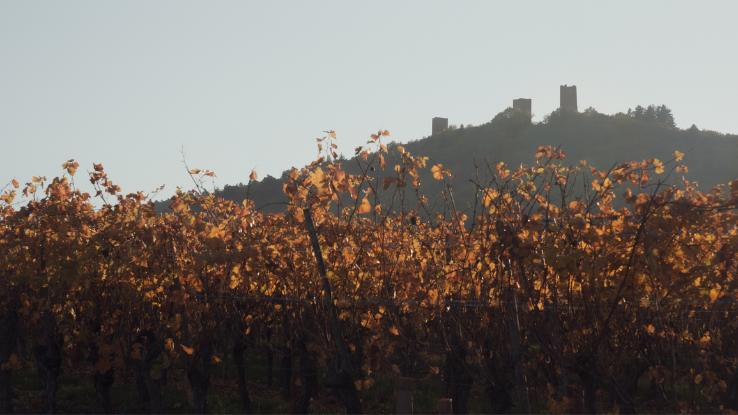
Under the Constitution of Luxembourg, the Grand Dukes have a constitutional right to live in the Colmar-Berg and the Grand Ducal Palace in Luxembourg City. Works of art were stolen from Colmar-Berg when the Nazis occupied it in World War II.
Mandalay Palace
Myanmar’s Mandalay Palace is located inside a walled fort surrounded by a moat. Every building in the complex, including the palace, is only a single-story high. The palace complex includes eight thrones, the greatest of which is the Sihasana Palanka, the Lion Throne.
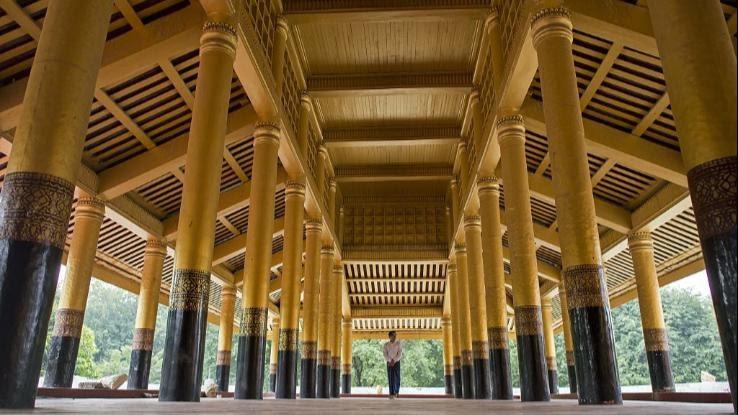
Myanmar’s last two kings, King Mindon and King Thibaw lived at Mandalay Palace. The palace’s role as the primary residence of the monarchy ended in 1885, when troops captured the royal family on the grounds. The palace was almost entirely destroyed by bombing during World War II, but a replica was rebuilt in the 1990s.
Zarzuela Palace
The Palacio Real de Madrid is the official residence of the Spanish Royal Family. It is actually only used for formal state events, but it certainly has room for a family, with an unbelievable 1.45 million square feet of space and 3,418 rooms. Nonetheless, King Felipe VI’s family lives at the Palace of Zarzuela instead.
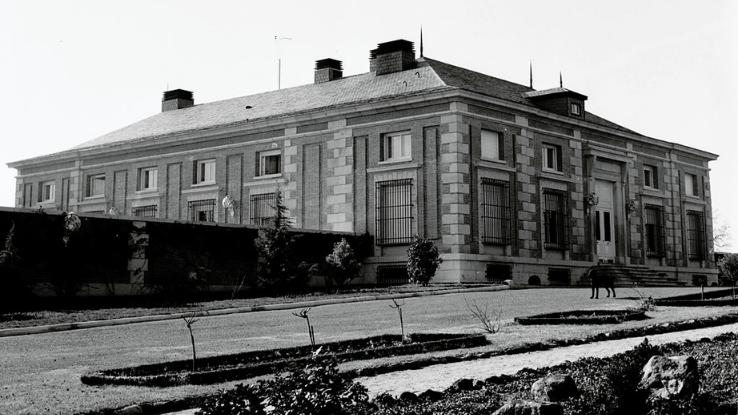
The palace was originally a hunting lodge. King Carlos IV expanded it and decorated it with tapestries, porcelain and an enormous clock collection. Since the future King Juan Carlos and Princess Sophia moved in in 1981, it has been the monarchy’s unofficial residence.
Mysore Palace
Mysore was the capital city of the Kingdom of Mysore from 1399 until 1956. Mysore Palace is the residence of the Hindu Yaduvanshi Wadiyar dynasty. The Kingdom of Mysore became part of the Dominion of India when it obtained independence from colonial Britain.
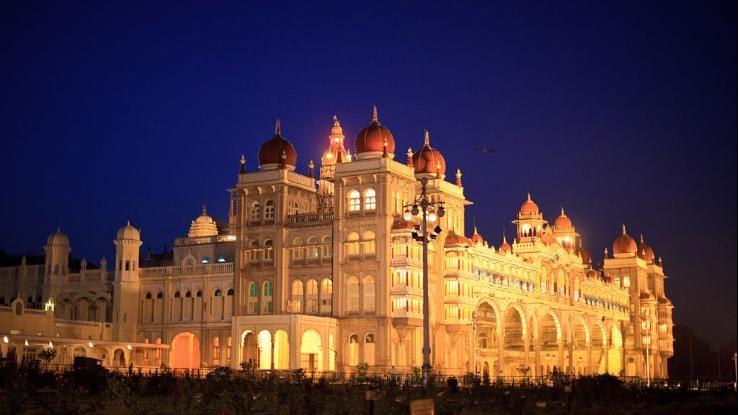
The current Mysore Palace was built from 1897 to 1912 after the original palace was destroyed in a fire. The palace’s domes merged Hindu, Mughal, Rajput and Gothic styles. The three-story structure has marble domes and a 145-foot tower. The central arch features a statue of Gajalakshmi, the Goddess of wealth, prosperity, fortune and abundance.
Balmoral Castle
Balmoral Castle is the British Royal Family’s Scottish home. Prince Albert leased the land in 1848 and then purchased it for Queen Victoria in 1852. Construction of a new castle — which eventually became Balmoral Castle — began in September 1853. Unlike her “official residences,” Balmoral Estate is owned by Queen Elizabeth personally.
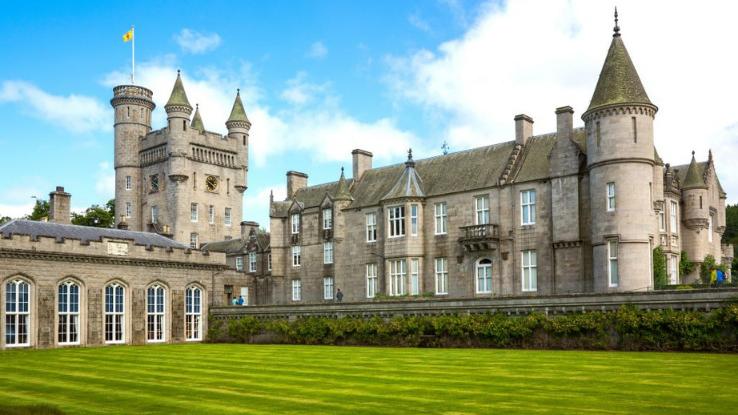
It consists of 18,659 hectares, an additional 2,940 hectares of grouse moor and another 4,688 hectares of sporting rights. The land is used for forestry, deer stalking, grouse shooting and farming and is home to the Queen’s Highland Cattle and Fell and Haflinger ponies.






